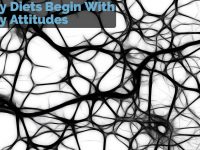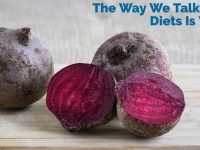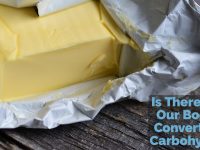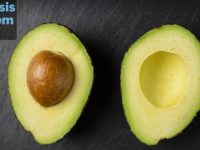Last week, I posted Part I of this two-part article series on losing weight. Most of what I covered in the previous article dealt with misconceptions and scientific realities of weight loss, because it’s my view that the best way to approach any diet is from a standpoint firmly rooted in scientific evidence. This week, I’m going to cover some more general tips—things that you should include in any weight loss diet you engage in.
To reiterate from Part I, this article series is not going to recommend for or against any particular diet. Most diets—provided they are not nutritionally ridiculous, like the only-fruit diets some people engage in—are effective for losing weight as long as one sticks to the plan. There are of course advantages and disadvantages to each that should be considered before committing to any one diet, but those differences are often highly personal and therefore subjective. Instead of worrying about subjective differences, we’ll cover the objective similarities, or the parts of the diet that should always be present.
Let’s begin!
#6: The Less Processed Your Food, the Easier It Will Be to Lose Weight
You’ve probably heard that all diets work because they cut out unhealthy, processed foods. This is a bit cliche and reductionistic, but it also happens to be relatively accurate—just not for the reasons you probably think.
Processed food, in-and-of-itself, is not “unhealthy” by nature (like anything else, it’s unhealthy only when consumed in unhealthy quantities), and the reason it tends to cause weight gain isn’t because of its health properties or lack thereof—the reason it causes weight gain is because it’s so easy to consume and absorb!
Every step of processing either makes the calories more available to us (such as by breaking down cell walls, or breaking down more complex molecules into simpler ones) or makes the calories easier to consume (such as by removing the need to cook). If all of your food is processed, a lot of the work is done for you, and it’s very easy to overeat.
On the other hand, every step of processing you remove either makes the calories less available to us or makes it harder to overeat. At the very far extreme where every step of processing has been removed—a diet where you must hunt and gather and then prepare all your food yourself—you’ll find it extremely hard to gain weight.
You don’t need to go hunter-gatherer to lose weight, but removing processed food from your diet is always a good idea for weight loss. So, eat more raw foods and cook any meals you eat yourself and weight loss will come easier.
#7: Set Time Goals in Addition to (Or Instead of) Weight Goals
Unlike the typical weight loss population, many climbers seeking to lose weight don’t necessarily have a tremendous amount to lose. Their target could be as small as 5-10 lbs or perhaps 20-30 lbs, but only rarely in my experience is the goal in the 50+ lb range. When such a small amount of weight is at stake, it often makes more sense to set time-based goals rather than weight goals.
With a time-based goal, you integrate weight loss phases into your training cycle rather than change your diet around to permanently be in a deficit. This allows you to focus on each goal in turn, progressing towards each of your training goals without a single, overarching goal affecting the lot of them. You let go of the expectation to achieve (and maintain) a concrete weight, and instead focus on being strong and lean.
Time-based goals aren’t always appropriate, but it may be right anytime your weight loss goal is in tandem with a goal to improve strength and doesn’t involve losing greater than 20% of your body weight. If this is the case, cycle 8-10 week periods of weight loss into your training (works well with power phases, or any phase that doesn’t directly rely on strength gain) and go for it!
#8: Don’t Fall Into the “Minimize Eating; Maximize Activity” Trap
When weight loss first begins, most people have an excess of motivation and energy to go make it happen—but instead of pacing themselves, they go all in and burn out quickly. Just like you shouldn’t start a marathon at a sprint, you need to preserve yourself and your mental energy while losing weight.
For weight loss, “sprinting” means cutting calories well below a reasonable amount of jacking activity up to greater than normal levels. You wind up with an enormous caloric deficit for the first few days, but then the body sabotages you. You feel constantly hungry, irritable, and you lose the motivation to train. It’s impossible to proceed with the diet correctly, and even if you do, you’ve spent all the willpower you need to make it for the long-haul.
When you’re losing weight, aim for a maximum of two pounds per week. When working with clients, I usually set their caloric goals at such a level that they will lose only one pound per week unless they exercise, which allows for up to two pounds depending on their total activity. This keeps their energy levels high and provides enough food that they never feel as though they’re starving, both of which ultimately allow them to “go the distance”.
Don’t burn out in a mad dash for rapid weight loss; pace yourself, and you’ll be much more likely to succeed.
#9: Be Patient and Proud of Yourself
Diets are hard, and because diets are hard, you should expect to hit some stumbling blocks. You should expect to cheat some, have off-days, and occasionally be frustrated. But despite all of your perceived failings, you should also remember to be patient and proud of yourself!
Permanent weight loss is a long-term goal, and nobody progresses towards long-term goals in arrow-straight paths. There will always be setbacks, but as long as you keep working towards your goal one step at a time, you’ll eventually make it.
In other words, don’t get bummed too easily, and don’t beat yourself up. You’ve probably had bad climbing days, bad training days, bad days in general—but they pass, and are always followed eventually by good days. The same is true for your diet and weight loss. Keep your chin up and stick with it!
#10: Don’t Let Others Bring You Down
One of the most frustrating parts of losing weight—really, of any dietary change—is the amount of push-back you’ll get from friends and family who “only want to help”. Usually, this “help” comes in the form of admonitions or statements that you’re fine the weight you are so why are you doing this? As well-intentioned as they may feel they are, it’s almost never actually helpful, and the best thing you can do is to politely ignore them.
Right at the beginning, I wrote that you should question yourself as to whether weight loss is really necessary. I’m going to assume you did that, and that you’ve determined that your weight loss goal has a purpose and will not bring you down to an unhealthy weight. I’m going to further assume that you’re not going to engage in any disordered eating patterns, and will be approaching weight loss in a healthy, rational way. And assuming that all this is true, then your friends and family have nothing to be concerned about! This is your goal, and you have a specific, logical end-game in mind.
People hate change they can’t control, and their attitudes are often a reflection of their own insecurities about themselves. Don’t let them bring you down, but also don’t be dismissive of their feelings. Reassure them of who you are and what they mean to you, and frame your goals exactly as they are—long-term goals you’re working towards as an athlete and a climber.
Conclusion
Losing weight isn’t easy, but it doesn’t have to be as hard as some dogma-driven diets make it out to be. Science-driven, rational weight loss takes the mysticism out of dieting and replaces it with logic.
To reiterate the points from above (and Part I)…
- Do You Need to Lose Weight At All? What’s your goal? Is weight loss essential to achieving your goal? Are there better paths to follow? How important is weight loss compared to other goals?
- All Weight Loss Happens Through Caloric Restriction. Weight loss isn’t magic, it requires a caloric deficit. No caloric deficit, no weight loss.
- There Is No Such Thing as the “Perfect” Weight Loss Diet. All nutritionally sound diets are roughly equally effective at driving weight loss. The most important consideration is whether a diet works for you.
- All Diets Require Change. It’s a myth that you can lose weight on a perfectly normal diet that anyone else would eat. At the very least, all weight loss requires a caloric deficit, which means eating less than you need for maintenance.
- There Is No Weight Loss Supplement That Is Truly Effective. All the legal supplements marketed towards weight loss either don’t work or work so poorly that they’re basically worthless.
- The Less Processed Your Food, the Easier It Will Be to Lose Weight. Processed food is easy to eat and easy to digest, both of which make caloric deficits hard to maintain.
- Set Time Goals In Addition to (or Instead Of) Weight Goals. If you only have a small amount of weight to lose (<20% your body weight weight), then a time-based goal is often better than just shooting for a goal weight and going until you reach it.
- Don’t Fall Into the “Minimize Eating; Maximize Activity” Trap. Losing weight is a marathon, not a sprint. Pace yourself so you lose weight gradually and consistently and don’t burn out in the first couple weeks.
- Be Patient and Proud of Yourself. There will be setbacks and you will fall, but don’t get discouraged. Keep your long-term goals in mind, forget your failures, and celebrate your victories!
- Don’t Let Others Bring You Down. Those who care most for you will often unconsciously try to hold you back; don’t let them. Be kind about their concerns, but ultimately you may just have to ignore them.
Follow these tips, and you’ll be on a good track for losing weight!















Could you do a post on how a “time goal” for weight loss would work. Say you want to drop 4-5% body fat and you have a goal of 6 weeks. (I have no idea whether that time frame makes sense). I mean healthy and sustainable weight loss of course.
Great post!
That’s a good idea—I’ll try to write one in the coming weeks!
Now that we have the primer, can you make a recommended meal plan and food items which encourage healthy and sustainable weight reduction. I really do not want to go back to protein shakes, tuna fish and rice…. :-\ Despite being able to lift bigger on that “diet”.
Good idea! In the coming year, I’m planning on doing some write-ups on diets, and I’ll be sure to include a few on losing weight in a healthy and sustainable way that doesn’t revolve solely around protein shakes, tuna, chicken breasts and broccoli (another staple protein-rich diet food you forgot!), and rice.